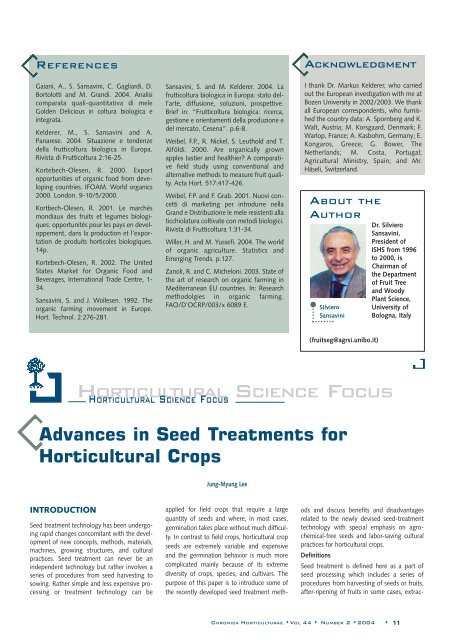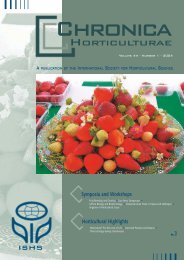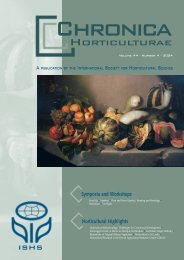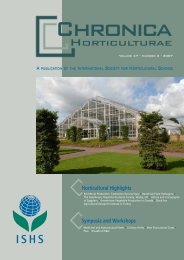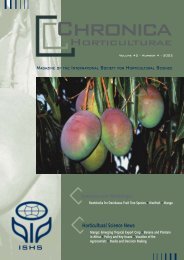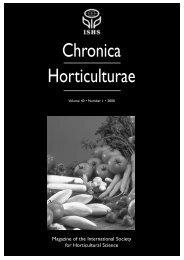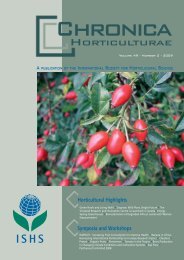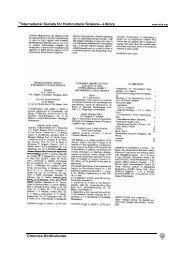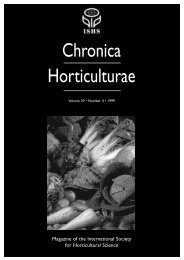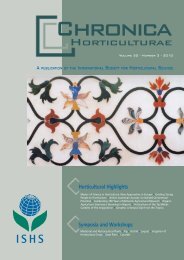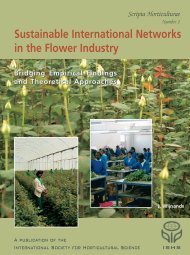Number 2 - 2004 - Acta Horticulturae
Number 2 - 2004 - Acta Horticulturae
Number 2 - 2004 - Acta Horticulturae
Create successful ePaper yourself
Turn your PDF publications into a flip-book with our unique Google optimized e-Paper software.
REFERENCES<br />
Gaiani, A., S. Sansavini, C. Gagliardi, D.<br />
Bortolotti and M. Grandi. <strong>2004</strong>. Analisi<br />
comparata quali-quantitativa di mele<br />
Golden Delicious in coltura biologica e<br />
integrata.<br />
Kelderer, M., S. Sansavini and A.<br />
Panarese. <strong>2004</strong>. Situazione e tendenze<br />
della frutticoltura biologica in Europa.<br />
Rivista di Frutticoltura 2:16-25.<br />
Kortebech-Olesen, R. 2000. Export<br />
opportunities of organic food from developing<br />
countries. IFOAM. World organics<br />
2000. London. 9-10/5/2000.<br />
Kortbech-Olesen, R. 2001. Le marchés<br />
mondiaux des fruits et legumes biologiques:<br />
opportunités pour les pays en developpement,<br />
dans la production et l’exportation<br />
de produits horticoles biologiques.<br />
14p.<br />
Kortebech-Olesen, R. 2002. The United<br />
States Market for Organic Food and<br />
Beverages, International Trade Centre, 1-<br />
34.<br />
Sansavini, S. and J. Wollesen. 1992. The<br />
organic farming movement in Europe.<br />
Hort. Technol. 2:276-281.<br />
Sansavini, S. and M. Kelderer. <strong>2004</strong>. La<br />
frutticoltura biologica in Europa: stato dell’arte,<br />
diffusione, soluzioni, prospettive.<br />
Brief in: “Frutticoltura biologica: ricerca,<br />
gestione e orientamenti della produzione e<br />
del mercato, Cesena”. p.6-8.<br />
Weibel, F.P., R. Nickel, S. Leuthold and T.<br />
Alföldi. 2000. Are organically grown<br />
apples tastier and healthier? A comparative<br />
field study using conventional and<br />
alternative methods to measure fruit quality.<br />
<strong>Acta</strong> Hort. 517:417-426.<br />
Weibel, F.P. and F. Grab. 2001. Nuovi concetti<br />
di marketing per introdurre nella<br />
Grand e Distribuzione le mele resistenti alla<br />
ticchiolatura coltivate con metodi biologici.<br />
Rivista di Frutticoltura 1:31-34.<br />
Willer, H. and M. Yussefi. <strong>2004</strong>. The world<br />
of organic agriculture. Statistics and<br />
Emerging Trends. p.127.<br />
Zanoli, R. and C. Micheloni. 2003. State of<br />
the art of research on organic farming in<br />
Mediterranean EU countries. In: Research<br />
methodolgies in organic farming.<br />
FAO/D’OCRP/003/x 6089 E.<br />
ACKNOWLEDGMENT<br />
I thank Dr. Markus Kelderer, who carried<br />
out the European investigation with me at<br />
Bozen University in 2002/2003. We thank<br />
all European correspondents, who furnished<br />
the country data: A. Spornberg and K.<br />
Walt, Austria; M. Korsgaard, Denmark; F.<br />
Warlop, France; A. Kasbohm, Germany; E.<br />
Kongaros, Greece; G. Bower, The<br />
Netherlands; M. Costa, Portugal;<br />
Agricultural Ministry, Spain; and Mr.<br />
Häseli, Switzerland.<br />
ABOUT THE<br />
AUTHOR<br />
Dr. Silviero<br />
Sansavini,<br />
President of<br />
ISHS from 1996<br />
to 2000, is<br />
Chairman of<br />
the Department<br />
of Fruit Tree<br />
and Woody<br />
Silviero<br />
Sansavini<br />
Plant Science,<br />
University of<br />
Bologna, Italy<br />
(fruitseg@agrsi.unibo.it)<br />
HORTICULTURAL SCIENCE FOCUS<br />
HORTICULTURAL SCIENCE FOCUS<br />
Advances in Seed Treatments for<br />
Horticultural Crops<br />
Jung-Myung Lee<br />
INTRODUCTION<br />
Seed treatment technology has been undergoing<br />
rapid changes concomitant with the development<br />
of new concepts, methods, materials,<br />
machines, growing structures, and cultural<br />
practices. Seed treatment can never be an<br />
independent technology but rather involves a<br />
series of procedures from seed harvesting to<br />
sowing. Rather simple and less expensive processing<br />
or treatment technology can be<br />
applied for field crops that require a large<br />
quantity of seeds and where, in most cases,<br />
germination takes place without much difficulty.<br />
In contrast to field crops, horticultural crop<br />
seeds are extremely variable and expensive<br />
and the germination behavior is much more<br />
complicated mainly because of its extreme<br />
diversity of crops, species, and cultivars. The<br />
purpose of this paper is to introduce some of<br />
the recently developed seed treatment methods<br />
and discuss benefits and disadvantages<br />
related to the newly devised seed-treatment<br />
technology with special emphasis on agrochemical-free<br />
seeds and labor-saving cultural<br />
practices for horticultural crops.<br />
Definitions<br />
Seed treatment is defined here as a part of<br />
seed processing which includes a series of<br />
procedures from harvesting of seeds or fruits,<br />
after-ripening of fruits in some cases, extrac-<br />
CHRONICA HORTICULTURAE •VOL 44 • NUMBER 2 • <strong>2004</strong> • 11


